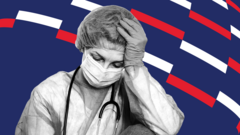In the idyllic beach town of Streaky Bay, Victoria Bradley, the sole permanent doctor, highlights the personal toll of a crumbling healthcare infrastructure. After years of burnout, she stepped away from her role but felt compelled to return out of community obligation. Streaky Bay's limited facilities reflect a broader national crisis in which inadequate government funding exacerbates a shortage of healthcare practitioners, leading to delayed care and rising patient costs - a situation affecting Australians regardless of their location.
Since the inception of Medicare over forty years ago, expected reforms and support have faltered, and experts believe that the promise of accessible high-quality medical care has weakened, leaving many Australians frustrated and concerned. As both major political parties promise financial support during the election campaign, skepticism surrounds their proposed measures, with many viewing them as insufficient to address systemic issues.
Renee Elliott's experience highlights the painful realities many Australians face. After discovering lumps in her breast, she was left navigating a complex labyrinth of care that entailed extensive travel and significant expenses, underscoring the inadequacies of a system once regarded as a "national treasure." The observation that the wealthier segments of society receive better healthcare outcomes than poorer areas adds an additional layer of urgency to the debate over universal healthcare.
Many Australians are missing out on essential medical treatment due to rising out-of-pocket costs, leading some to rely on charities or delay seeking care altogether. A significant portion of the population has adjusted their financial priorities in a desperate attempt to afford medical interventions, creating a cycle that further strains an already beleaguered system.
As stakeholders call for robust reforms, proposals from both the Labor Party and the Liberal-National coalition have been viewed as insufficient. Experts suggest a reevaluation of how Medicare compensates healthcare providers is critical, stressing that the current model does not adequately reflect the needs of the population served. Without substantial reforms to the funding structure of healthcare, many fear that universal access may become an elusive ideal in a rapidly changing world.
The upcoming election not only poses a challenge regarding healthcare reform but also serves as a litmus test for Australia's values and commitment to social safety nets. The need for prioritizing meaningful solutions over short-term remedies has never been more pressing, leaving Australians to wonder if their cherished system of universal healthcare can be revived before it is too late.
Since the inception of Medicare over forty years ago, expected reforms and support have faltered, and experts believe that the promise of accessible high-quality medical care has weakened, leaving many Australians frustrated and concerned. As both major political parties promise financial support during the election campaign, skepticism surrounds their proposed measures, with many viewing them as insufficient to address systemic issues.
Renee Elliott's experience highlights the painful realities many Australians face. After discovering lumps in her breast, she was left navigating a complex labyrinth of care that entailed extensive travel and significant expenses, underscoring the inadequacies of a system once regarded as a "national treasure." The observation that the wealthier segments of society receive better healthcare outcomes than poorer areas adds an additional layer of urgency to the debate over universal healthcare.
Many Australians are missing out on essential medical treatment due to rising out-of-pocket costs, leading some to rely on charities or delay seeking care altogether. A significant portion of the population has adjusted their financial priorities in a desperate attempt to afford medical interventions, creating a cycle that further strains an already beleaguered system.
As stakeholders call for robust reforms, proposals from both the Labor Party and the Liberal-National coalition have been viewed as insufficient. Experts suggest a reevaluation of how Medicare compensates healthcare providers is critical, stressing that the current model does not adequately reflect the needs of the population served. Without substantial reforms to the funding structure of healthcare, many fear that universal access may become an elusive ideal in a rapidly changing world.
The upcoming election not only poses a challenge regarding healthcare reform but also serves as a litmus test for Australia's values and commitment to social safety nets. The need for prioritizing meaningful solutions over short-term remedies has never been more pressing, leaving Australians to wonder if their cherished system of universal healthcare can be revived before it is too late.


















